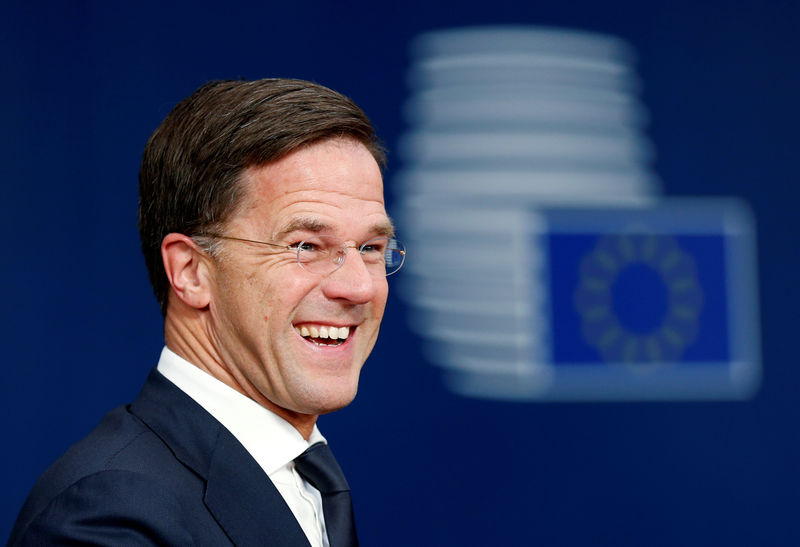 © Reuters. Netherlands’ PM Rutte arrives to attend the EU leaders summit in Brussels
© Reuters. Netherlands’ PM Rutte arrives to attend the EU leaders summit in BrusselsBy Jan Strupczewski
BRUSSELS (Reuters) – The euro zone does not need a special budget to help deal with crises, but rather 19 healthy national budgets that can withstand economic shocks, Dutch Prime Ministers Mark Rutte will tell his fellow European Union leaders on Friday.
French President Emmanuel Macron has called for a special euro zone budget of several hundred billion euros to pay for various joint projects, while the euro zone bailout fund has advocated setting up a fund of up to 200 billion euros ($236 billion) to soften crises that hit one or a handful of euro zone countries.
A new, centralized pool of money for the euro zone is one of the key ideas for deeper euro zone integration that EU leaders are discussing with a view to take decisions in June 2018.
“I am not in favor of one big European shock absorption fund but 19 smaller ones. These being the countries themselves and their ability to deal with crises individually,” Rutte told reporters in remarks he was set to repeat to EU leaders on Friday.
Germany, like the Netherlands, believes no euro zone budget is needed.
For budgets to be sound, the European Commission must better enforce existing EU budget rules, called the Stability and Growth Pact, which set limits on government borrowing.
“Each time the Commission overlooks violations of that pact, which happens too often if you ask me, it makes us weaker instead of stronger,” Rutte said.
He will also call for establishing a clear link between receiving EU funds by governments and their implementation of reforms suggested each year by the Commission.
Before changing anything in the current euro zone set-up, leaders should focus on strengthening the banking sector. But he said that to introduce a proposed euro zone-wide deposit insurance scheme, banks had to reduce risks they take first.
He said this included changing the risk weights of various government bonds that under current rules are all considered risk-free.
“It’s a fact that not all government bonds are created equal. The associated risk needs to be reflected on balance sheets,” Rutte said.
The Netherlands also wants, like Germany and Slovakia, to introduce a sovereign debt restructuring mechanism that would set out the rules for private investors’ losses in case government debt has to be restructured.
Rutte will stress that responsibility for the euro was with national governments, rather than with EU institutions, putting himself in opposition to European Commission proposals aimed at turning euro zone government bodies like the Eurogroup of ministers and their bailout fund, into EU institutions.
Fusion Media or anyone involved with Fusion Media will not accept any liability for loss or damage as a result of reliance on the information including data, quotes, charts and buy/sell signals contained within this website. Please be fully informed regarding the risks and costs associated with trading the financial markets, it is one of the riskiest investment forms possible.
Source: Investing.com

























